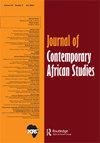前言:在加纳组建维和部队和警察
IF 0.8
Q2 AREA STUDIES
引用次数: 2
摘要
通过对加纳案例的探讨,本期特刊提供了迄今为止文献中尚不完善的关于联合国维和的两种观点。首先,特刊中的文章并没有将特派团及其东道国作为分析出发点,而是侧重于维持和平如何影响加纳的国内安全——自1960年以来,加纳一直为维持和平提供安全人员。其次,将重点放在维持和平与执法之间的联系上,而不是军事部分,从而关注维持和平与执法之间的联系,以及由国家批准的加纳警察局、加纳武装部队和一系列非国家行为体执行的警务如何与可追溯到特派团部署的实践、思想和话语交织在一起,并在一定程度上受到这些实践、思想和话语的影响。从理论上讲,集合的概念被用来描述维持和平如何跨越国家边界,并与国内安全规定的政治和实践相交叉。无论是在国家机构层面,还是在个别警察的日常警务中,秩序制定的实践和话语都是由众多逻辑和历史的集合构成的,这些逻辑和历史既相互融合、同化,又相互矛盾和对立。本期特刊探讨的是维持和平的经验是如何成为这些不断演变的组合的一部分并形成这些组合的。变化可能是体制和宏观政治方面的,但也往往是非常个人化的,对安全人员如何看待和履行自己的角色有影响。本文章由计算机程序翻译,如有差异,请以英文原文为准。
Introduction: Assembling Peacekeeping and Policing in Ghana
By exploring the case of Ghana, this special issue provides two perspectives on UN peacekeeping that until now have been underdeveloped in the literature. First, rather than taking a mission and its host country as the analytical point of departure, the contributions in the special issue focus on how peacekeeping has shaped domestic security in Ghana – a consistent contributor of security personnel to peacekeeping since 1960. Second, instead of focusing on the military component, attention is paid to the link between peacekeeping and law enforcement, and thus how policing – as carried out by the state-sanctioned Ghana Police Service, Ghana Armed Forces and a range of non-state actors – intertwines with and is partially shaped by practices, ideas and discourse that can be traced back to mission deployments. Theoretically, the concept of assemblage is used to frame how peacekeeping stretches across state boundaries and intersects with the politics and practices of domestic security provision. Both at a state institutional level, and in day-to-day policing by individual police officers, order-making practices and discourses are constituted by the assembling of a multitude of logics and historicities that integrate and assimilate as well as contradict and oppose one another. It is how the experience of peacekeeping becomes part of and shapes these ever-evolving assemblages that the contributions to this special issue investigate. Changes may be institutional and macro-political but are as often deeply personal and individualised, with implications for how security personnel perceive and practice their roles.
求助全文
通过发布文献求助,成功后即可免费获取论文全文。
去求助
来源期刊

Journal of Contemporary African Studies
AREA STUDIES-
CiteScore
2.20
自引率
0.00%
发文量
18
期刊介绍:
Journal of Contemporary African Studies (JCAS) is an interdisciplinary journal seeking to promote an African-centred scholarly understanding of societies on the continent and their location within the global political economy. Its scope extends across a wide range of social science and humanities disciplines with topics covered including, but not limited to, culture, development, education, environmental questions, gender, government, labour, land, leadership, political economy politics, social movements, sociology of knowledge and welfare. JCAS welcomes contributions reviewing general trends in the academic literature with a specific focus on debates and developments in Africa as part of a broader aim of contributing towards the development of viable communities of African scholarship. The journal publishes original research articles, book reviews, notes from the field, debates, research reports and occasional review essays. It also publishes special issues and welcomes proposals for new topics. JCAS is published four times a year, in January, April, July and October.
 求助内容:
求助内容: 应助结果提醒方式:
应助结果提醒方式:


